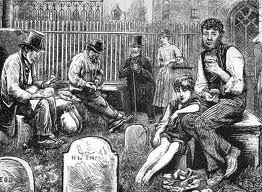 As in the past, modern governments differentiate between the ‘deserving’ and the ‘undeserving’ poor. The ‘deserving’ are those in need who are unable to work because they are too old, disabled, or too sick. The ‘undeserving’ are people who don’t want to work and often it is assumed that all able-bodied unemployed people fit into that category.
As in the past, modern governments differentiate between the ‘deserving’ and the ‘undeserving’ poor. The ‘deserving’ are those in need who are unable to work because they are too old, disabled, or too sick. The ‘undeserving’ are people who don’t want to work and often it is assumed that all able-bodied unemployed people fit into that category.
Until the 20th century English governments made provision for such people through local poor-taxes levied on householders. However they were careful to do this in a way that “deterred all but the most desperate” from taking up help in the poor houses. It was necessary to ensure that such ‘welfare’ kept the unemployed in a poorer and more miserable state than the lowliest worker in order to ensure that there remained an incentive to work at even the worst of jobs.
The introduction of unemployment benefits in Britain, was accompanied by the ‘search for the scrounger’. In 1905 the Birmingham Chamber of Commerce proposed a system of labour registries to differentiate between the deserving and temporarily unemployed and the undeserving malingerer:
it is essential that permanent machinery be constructed for obtaining reliable information as to the number of persons out of work who are entitled to be classed as bona fide unemployed, that is to say, men who, through some cause over which they have no control, are temporarily out of work....With regard to the other class, the unemployable, the wastrel and the loafer, the sternest measures are necessary...
 When Franklin Roosevelt (pictured) established public assistance for families with dependent children in the US he did not extend it to the unemployed generally, who were supposed to be covered by short term contributory insurance. They were not ‘deserving’ of public welfare. The distinction between the deserving and the non-deserving poor meant that welfare in the form of Assistance to Families with Dependent Children (AFDC) was restricted to single women and families of unemployed men.
When Franklin Roosevelt (pictured) established public assistance for families with dependent children in the US he did not extend it to the unemployed generally, who were supposed to be covered by short term contributory insurance. They were not ‘deserving’ of public welfare. The distinction between the deserving and the non-deserving poor meant that welfare in the form of Assistance to Families with Dependent Children (AFDC) was restricted to single women and families of unemployed men.
These distinctions between deserving and undeserving have been reflected in differences in treatment of welfare recipients by governments. Welfare benefits accorded to pensioners (aged and disabled) are generally significantly higher and less conditional than those given to unemployment beneficiaries. Such distinctions are thought necessary to preserve the work ethic and to signify to the wider community “what behaviours are deemed virtuous or deviant”.
Even today the quality of service and degree of assistance provided to the unemployed is kept inadequate to ensure that only the most deserving cases take advantage of it. The quality of shelter provided to the homeless is uniformly bad in the UK and it is almost always in short supply. In Australia people are often turned away from hostels for lack of room. Some hostels are full by 9 am.